Vitality Stadium: AFC Bournemouth
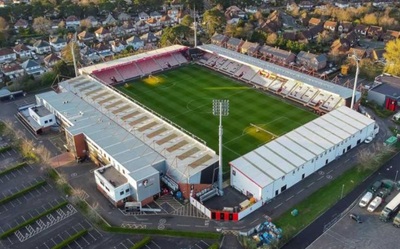
From AFC Bournemouth
Originally known as Dean Court but nowadays called The Vitality Stadium because of sponsorship, AFC Bournemouth’s home ground was built on the site of an old gravel pit. Owing to the fact that it wasn’t built in time for the start of the 1910-1911 season, Boscombe FC’s players (as the club was then known) had to get changed in a nearby hotel.
The ground itself was demolished and completely rebuilt in 2001 and, as part of the re-design, the pitch was rotated a full 90 degrees from its original position. It is the smallest stadium in the Premier League at present, with the club’s promotion to the top flight being something of a wonderful surprise to all involved at Bournemouth.
In February 2008 the club was forced to go into administration after having accumulated debts of around £4 million. They were hit with a 10 point deduction that saw them face a relegation battle and the whole episode nearly put them out of business altogether. That financial uncertainty would continue until the middle of 2009 when a consortium bought the club just a month after they narrowly avoided being relegated from League Two into obscurity. Their march to the Premier League has been a long and troubled one, with The Vitality Stadium being witness to some remarkable feats achieved by the club.
Stats
| Vitality Stadium Stats | |
|---|---|
| Year Opened | 1910 |
| Capacity | 11307 |
| Average Attendance | 11098 |
| Record Attendance | 28799 (Man U v Bournemouth (1957)) |
| Pitch Size | 105 x 68 (7140) |
| Former Name | Dean Court, Goldsands Stadium, Seward Stadium, Fitness First Stadium |
| Owner | Structadene |
| Sponsor | Vitality |
| Clubs Hosted | AFC Bournemouth |
| First Fixture | Bournemouth & Boscombe Athletic v Swindon Town (01/09/1923) |
| AFC Bournemouth Stats | |
|---|---|
| Year Founded | 1890 |
| Nickname | The Cherries |
| Club Mascot | Cherry Bear |
| Rivals | Southampton, Brighton, Reading, Leeds |
| Previous Stadiums | King's Park, Avenue Stadium |
| Kit | Red & Black Stripes (Home) / Sky Blue (Away) / Green & Black (Third) |
| Training Ground | King's Park Training Base |
| Shirt Sponsor | BJ88 |
| Team Owner | Turquoise Bidco Limited / Black Knight Football |
| Record Goalscorer | Ronnie Eyre (229) |
| Record Appearances | Steve Fletcher (726) |
Vitality Stadium Photos
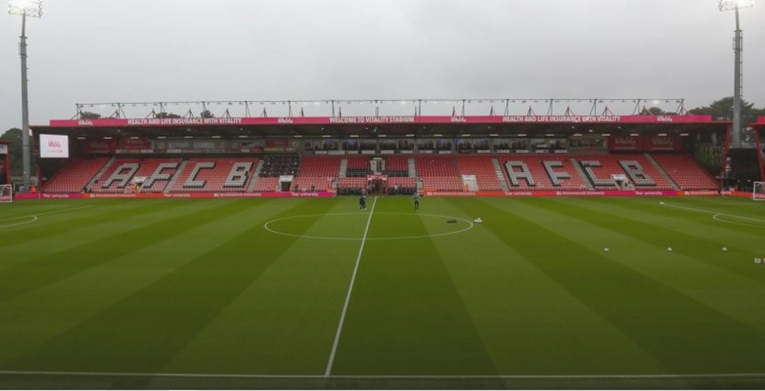
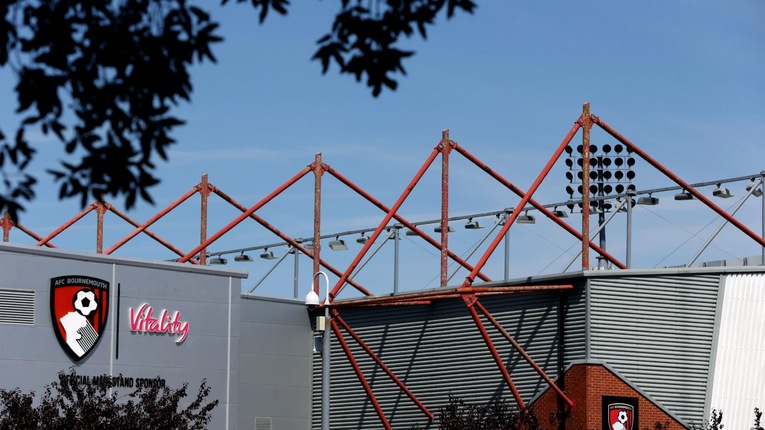
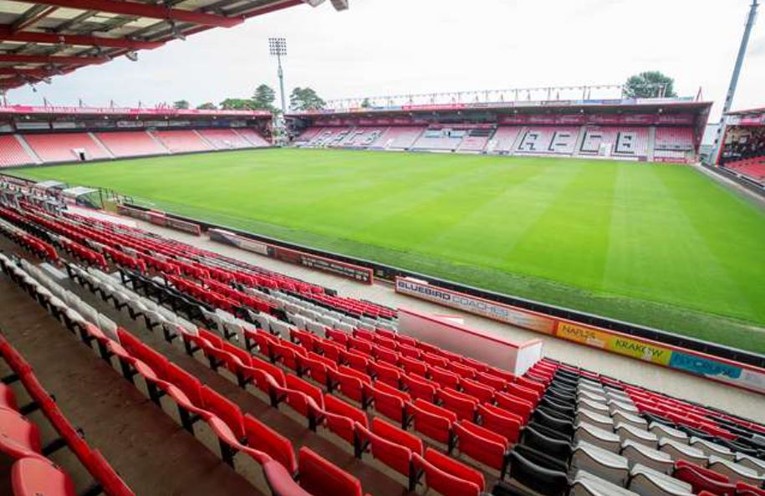
Vitality Stadium Seating Plan and Where to Sit
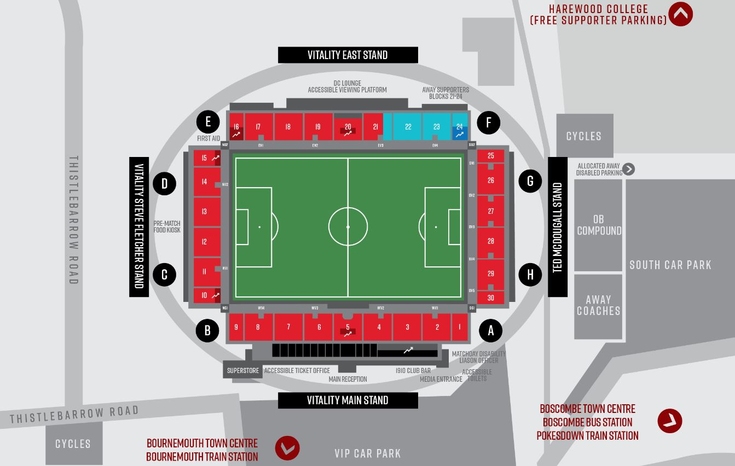
The Vitality is a small, tight but often intimidating ground thanks to the proximity of the crowd to the pitch. That combined with the fact that the club’s fans have seen them rise from relative obscurity to the heights of the Premier League means that the supporters are always up for the games. The Vitality is a traditional, four-sided stadium.
- The Vitality Main Stand – The largest stand in the ground with a capacity of nearly 3,500, The Main Stand also houses the club’s VIP section and conference facilities. The Main Stand also features two family stands and a junior fanzone, so it’s the best place to go if you’ve got kids.
- Colmar Ted MacDougall Stand – The newest part of the stadium, this section of The Vitality was officially opened in 2013 when Bournemouth played host to, of all teams, Real Madrid!
- Vitality Steven Fletcher Stand – The club is, seemingly, a fan of stands with long names and this is no exception. This is where the most loyal and vocal Cherries fans sit.
- The Vitality East Stand – The East Stand seats about 3,500 fans, with 1,500 of them being the away supporters.
AFC Bournemouth Ticket Prices
AFC Bournemouth categorise their ticket prices depending on the opposition for any given match, so the prices depend on the category and on where in the ground you are sitting.
There is a rather convoluted points system to get your head around as well as ‘Cherry Tuesdays’, but as for a basic guide on costs, here we’ll give you the cheapest and most expensive adult, junior and concession ticket prices. You can also buy family tickets, should you wish to attend with a group.
League Games
- Adult – Cat A: £37-£53 / Cat B: £34-£50 / Cat C: £28-£44
- Concession – Cat A: £26-£34 / Cat B: £23-£30 / Cat C: £18-£24
- Junior – Cat A: £9-£16 / Cat B: £7-£14 / Cat C: £5-£11
How To Get AFC Bournemouth Tickets
As The Vitality is such a small stadium games do tend to sell out rather quickly there, especially if the big boys like Liverpool, Arsenal or Manchester City come to town. Your first port of call in your search for tickets, then, should be the Bournemouth website. There’s also a ticket office at the back of the club shop at the ground itself. There may be some unsavoury types hanging around the ground on match days claiming to have tickets but we’d recommend against buying off them as they could be fake.
Where to Buy
Getting To Vitality Stadium
The Vitality Stadium is eminently accessible by numerous different transport methods. Although the ground is located just outside the city of Bournemouth itself, it is still walkable from local train stations, for example.
Train – Both Bournemouth and Pokesdown train stations are within walking distance of The Vitality, with the former taking around 30 minutes on foot and the latter more like 15 minutes. They also both have buses that run from them to near to the ground. Boscombe and Landsowne are also walkable to the ground.
Bus – More Bus Wilts & Dorset can take you from Lymington, Salisbury, Poole and Boscombe to within walking distance of the stadium, whilst Yellow Buses operate services from Bournemouth that also run through Pokesdown to within 5 minutes of the ground.
Car – As soon as you get close to the ground there will be brown signs directing you, though some may still refer to the stadium as Dean Court. From the North you’ll want the M6, the M42, the M40 and the A34 then the M3, the M27 and the A31 before hitting the A338. From the South it will be the A27, the M27 and the A31 to the A338. From the South-West you’ll take the A35 to the A338.
By Air – Aside from all of the London airports, the best bet if you’re looking to fly to Bournemouth is Bournemouth Airport itself. From there you can take the Yellow Bus A1 route to the city centre.
Taxi – The Vitality is less than 10 minutes drive from Bournemouth Train Station, traffic dependent, so expect to pay about £7 to get there by this method.
Parking Near Vitality Stadium
Like most things at Bournemouth, the parking is designed to be simple and cost effective. There is a car park to the South of the ground that costs just £3.50 for the duration of the match, though you must have a ticket to park there. There are also other parking locations not far from the ground, such as the Sovereign Centre or Harewood College.
Useful Resources
- Parking - Just Park
Vitality Stadium Hotels
Bournemouth is essentially a seaside town, so there are loads of bed & breakfast options for you to have a look at. We’ve found a few more specific places for you here, though.
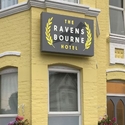
The Ravensbourne Hotel - £126+
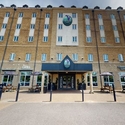
Village Hotel Bournemouth - £156+
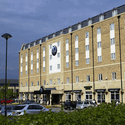
Village Hotel Bournemouth - About £95+
Pubs and Bars Near Vitality Stadium
Owing to the fact that the stadium itself a little outside of Bournemouth centre you might not find an ideal place to drink all that close to the ground. Instead you may wish to explore the city centre or nearby Boscombe for a pre-match pint and a bite to eat.
Walkabout
The Queens Park Hotel
Lions Head
Facilities
As the Premier League’s smallest ground, the facilities you’ll enjoy at The Vitality aren’t quite as impressive as you’d expect from the bigger, more famous stadiums in the country. That said you’ll still be able to get a drink or a bite to eat on the concourse and there are plenty of toilets available, too. You’ll also find places to put a bet on before the match kicks off, should you be particularly confident about the outcome of the game.
Prices
- Programme: £3.5
- Pie: £4
- Cup of tea: £2.5
- Beer: £4
Hospitality
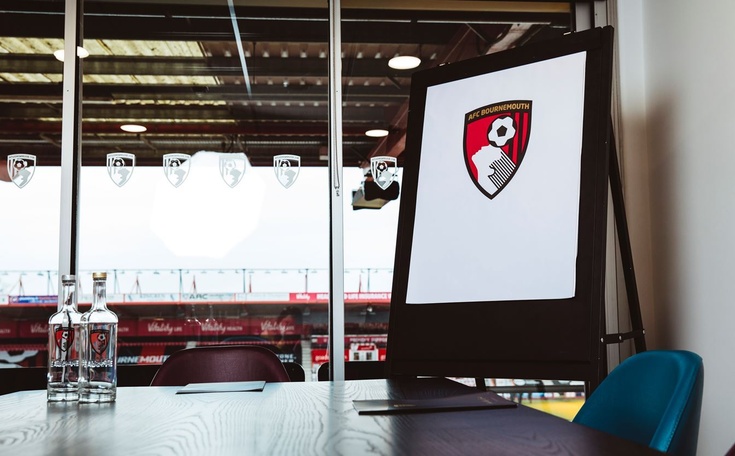
Just because The Vitality is a small stadium doesn’t mean that the hospitality options are lacking. You can sponsor the match day, have a young member of your group become the club mascot for the day or even enjoy panoramic views of the stadium from an executive box. If you really love the Cherries you can become a Vice President for a season and enjoy reserved seating, thee-course meals and access to a private lounge.
There aren’t a dizzying array of hospitality packages like at other grounds, but the experience itself will be similar, with food and drink serves, match day programmes, half time refreshments, etc.
Private Hire
There are a host of private hire options at The Vitality, including the club’s very own champagne lounge, Bubbles. This is an ideal location for parties, bridal showers, product launches and more. From lounges to executive suites, there are plenty of options for you to explore depending on the size of your party. The club even runs a business club once a month for you to meet like-minded business people.
Stadium Tours & Museum
At the time of writing Bournemouth don’t offer tours of The Vitality Stadium, other than the odd competition prize, although that is something that could change in the future.
About AFC Bournemouth
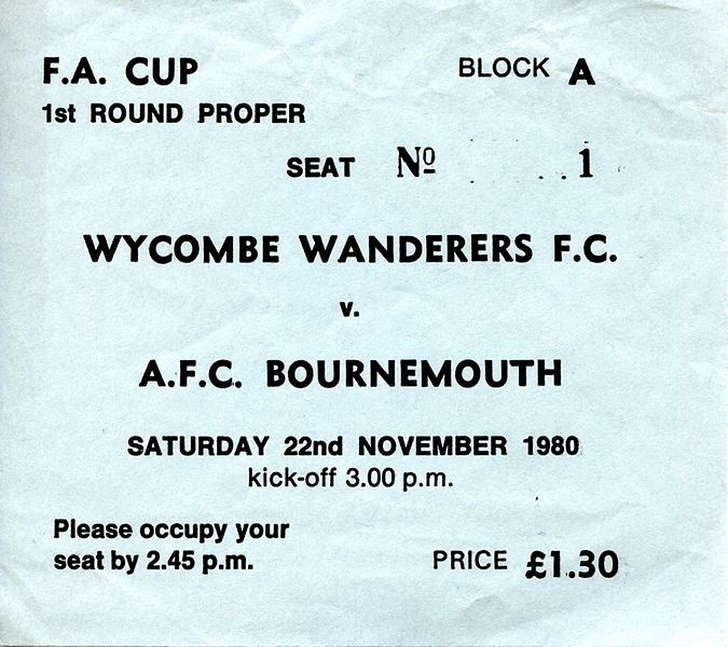
Beginning life as Boscombe FC before becoming Bournemouth and Boscombe Athletic Football Club in 1923 and finally the more stream-lined AFC Bournemouth in 1972, the club got the nickname the Cherries because of the numerous cherry orchards that used to stand near the Cooper-Dean estate where Dean Court was built.
It’s fair to say that Cherries fans have seen the club go through virtually everything, from going through administration to nearly disappearing from the football league altogether, the club’s march to the Premier League was hard-fought but much deserved. They made it into the top flight as the winners of the Championship in 2014-2015 with 90 points, just one point clear of fellow promoted team Watford.
Notable alumni of Bournemouth include Harry Redknapp, the former Portsmouth and Tottenham Hotspur manager, Tony Pulis who made his name here before moving on to manage Stoke City and is the current manager of West Bromwich Albion, and Sean O’Driscoll. O’Driscoll is considered by many in the game to be one of the best number 2s as well as a talented manager in his own right.
Vitality Stadium History
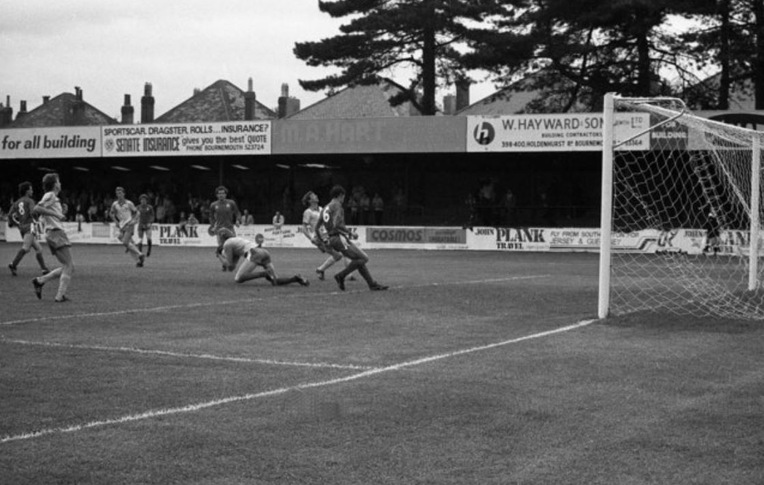
So much of The Vitality Stadium’s history is dependent on when you consider what you’re talking about to have become relevant. Should it only be from when Bournemouth become Bournemouth in 1972? What about when the stadium was completely knocked down and re-built in 2001? The record attendance came in an FA Cup match against Manchester United in 1957, whilst the first match against Swindon was the first football league match, not the first match ever played. A club rich with history and intrigue and different things to talk about in different eras.
Bournemouth’s stadium was originally called Dean Court because it was named after the Cooper-Dean family who gave the team, then called Boscombe Football Club, the ground to build on. If things had gone to plan in the 1980s then there would also be a leisure centre on the grounds, but a lack of funding meant the club had to abandon their plans. It’s now got housing on it instead.
Future Developments
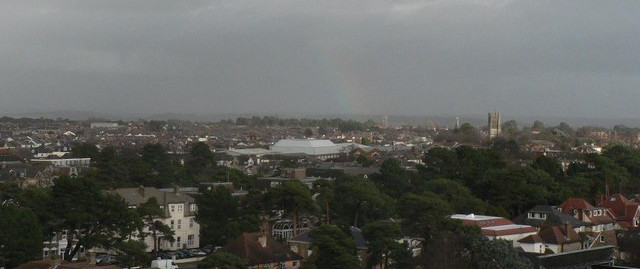
The club’s owner from 2011-2022, Maxim Demin, invested around £6 million to make improvements to the ground in the past, and in 2017 confirmed they were looking into building a brand new stadium. However, those plans were shelved after being deemed ‘too optimistic’.
Since Demin sold the club, however, they again announced their plans to find a new site to build a new stadium in 2023. They didn’t have to look far, settling on the site of their current training ground, where they plan to build an 18,500 seater ground, with the ability to be extended to 22,000 at a later date. No work has begun as of yet.
